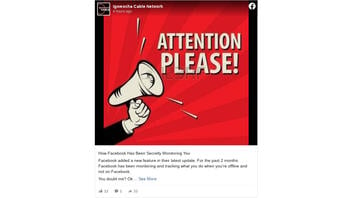
Did Facebook add a new feature that has allowed the platform to monitor and track a user's activity -- including online banking -- and read their email even when they are off Facebook, and has this been going on for the last two months? No, Facebook does not snoop in a user's banking transactions or read emails they send, but the "Off-Facebook Activity" may track more of their online activity than a user realizes. Tracking is not something new, it has been a part of Facebook's business model for years. There are limits to what is tracked and the details of someone's banking transactions or the contents of their private emails, and information from password-protected accounts are not what is collected. If such information were leaked, that would constitute a data breach in the security of the bank or the email service provider. Some posts claim that there is a connection between Off-Facebook Activity and a "configuration change" that caused many people to be suddenly logged out of their Facebook account on January 22, 2021. These are two unrelated issues.
The claim surfaced in late January 2021 and was presented in several forms. One example is this post (archived here) published by Igweocha Cable Network on January 27, 2021, under the title "How Facebook Has Been Secretly Monitoring You." It opened:
Facebook added a new feature in their latest update. For the past 2 months Facebook has been monitoring and tracking what you do when you're offline and not on Facebook.
You doubt me? Ok
Kindly click on Facebook settings, scroll down to your Facebook information. Click on Facebook Activity, then click on OFF-FACEBOOK ACTIVITY.....you will see every single activity you did on your phone when not using Facebook. From booking a cab on your Uber app to using your Banking app for online transfers, to your internet activities on Google, etc; everything is there. Imagine if this information gets into the wrong hands. Imagine how Facebook has been invading our privacy unknown to us.
This is what the post looked like on Facebook at the time of writing:
(Source: Facebook screenshot taken on Wed Jan 27 19:34:28 2021 UTC)
The post continued:
To stop this unwarranted intrusion, go to more options click on it. Then go to manage future activity and turn it off. Ensure you clear the history as well.
Facebook owns WhatsApp and Instagram, which are other popular social media apps. Who knows the level of snooping those apps secretly do on us as we use them? I guess we might never know. I guess the only way to avoid all these unwarranted intrusion into our privacy is to uninstall these snooping apps.
Check your Facebook settings regularly to know if there's anything NEW.
So, don't say I haven't done anything for you this year....I just did..... Lol
This post claims that "every single activity you did on your phone when not using Facebook" will be listed in the "Off-Facebook Activity" section in the control panel of Facebook settings. This is not true. While many online stores, websites and apps will appear in the list, not "everything" a user has done is recorded there.
"Off-Facebook Activity" is not like a detailed log book of all the activity of a Facebook user when they leave Facebook. Only the businesses and apps that are using Facebook's business tools share the information they collect with Facebook. A business or website has to intentionally add tools, such as the Facebook Tracking Pixel or Facebook SDK (Software Development Kit) to its website to send the visitor's information back to Facebook.
Currently in the U.S., 59.7% of the top 6,000 websites have Facebook tracking, compared to Google trackers on 86.4% of the websites. In December of 2020, Ghostery, a digital privacy company that has been keeping tabs on tracking trends since 2017, published its latest report about online trackers. The big news, using a measurement based on "reach" (meaning the number of page views, not the number of websites) was that Amazon (29.4%) had moved past Facebook (23%) to take the second place spot behind Google (79.5%) with the most prevalent trackers in the USA. This was presented in a December 10, 2020, Forbes article, "Meet The Web's New Second-Place Tracker: Not Facebook, It's Amazon, New Report Finds."
The Facebook Tracking Pixel was pioneered in 2012, so off-platform tracking is nothing new. Questions about customer privacy have been steadily surfacing again, and it is quite a reach to suggest that Facebook's data collection has been a secret. There have been several scandals regarding Facebook and the misuse or collection of data. In 2019, it came to light that starting in 2016, approximately 1.5 million new Facebook users had been prompted to give their email password as they signed up for their account, and their email contact list had been uploaded without any permission having been given. Reuters reported that the company stated the underlying glitch had been fixed, in an article on April 17, 2019, "Facebook says it uploaded email contacts of up to 1.5 million users."
The Cambridge Analytica scandal came to light years after a researcher from Cambridge University had been able, in 2014, to take the consenting, paid participation of a few hundred thousand people using a personality profiling app, and expand that exponentially by also harvesting the data of 50 million of their friends as well. This data was then used by the company Cambridge Analytica to target political advertising at Americans during the 2016 election. This was reported on March 17, 2018, in The Guardian: "Revealed: 50 million Facebook profiles harvested for Cambridge Analytica in major data breach,"
A whistleblower has revealed to the Observer how Cambridge Analytica - a company owned by the hedge fund billionaire Robert Mercer, and headed at the time by Trump's key adviser Steve Bannon - used personal information taken without authorisation in early 2014 to build a system that could profile individual US voters, in order to target them with personalised political advertisements.
One year later The Guardian published a follow-up and included in that reporting were three promises that Mark Zuckerberg had made about changes in the wake of the Cambridge Analytica scandal. The third promise listed seems to be the one that was behind the creation of the current Off-Facebook Activity tool.
From The Guardian:
On 1 May, Facebook made its most ambitious promise - the creation of a "clear history" tool that would allow users to force Facebook to delete all the information it gathers about users as they browse the web. At the time, Facebook said the tool would "take a few months to build". As BuzzFeed News pointed out in February, it's been more than a few months. A Facebook spokeswoman did not provide a timeline for when the tool might actually be available, saying that it was taking time to get the tool right.
On May 1, 2018, Facebook published a blogpost about something called at the time, "Clear History."
Today, we're announcing plans to build Clear History. This feature will enable you to see the websites and apps that send us information when you use them, delete this information from your account, and turn off our ability to store it associated with your account going forward. Apps and websites that use features such as the Like button or Facebook Analytics send us information to make their content and ads better. We also use this information to make your experience on Facebook better.
If you clear your history or use the new setting, we'll remove identifying information so a history of the websites and apps you've used won't be associated with your account. We'll still provide apps and websites with aggregated analytics - for example, we can build reports when we're sent this information so we can tell developers if their apps are more popular with men or women in a certain age group. We can do this without storing the information in a way that's associated with your account, and as always, we don't tell advertisers who you are.
On August 20, 2019, The New York Times published an article, "Facebook's New Tool Lets You See Which Apps and Websites Tracked You." It explained:
The company introduced a new tool that lets people better see and control the information that Facebook has gathered about their browsing habits outside the social network.
The tool, Off-Facebook Activity, allows users to view the hundreds of sites and apps that share data and customer information with Facebook. They can disconnect the data from their account if they want.
The Off-Facebook Activity tool is not something new in 2021. An archived 2019 copy of Facebook's page explaining it is basically the same as the one visible on the website today. While the tool allows users a better view of what is going on behind the scenes, one subtle aspect of the carefully chosen phrasing from Facebook is not being explained in many of the viral posts that are circulating. For example, this post says, "...Then go to manage future activity and turn it off." Another post had it phrased this way:
To turn it off go to your Facebook Settings > Scroll down to "Off Facebook Activity" > then click "Clear History" (you will see everything they were tracking). Next click "Manage Your Off Facebook Activity" and turn off future activity."
On Facebook's page about Off-Facebook Activity, the phrase "turn it off" or "delete" is not used -- the described action is to "disconnect." Even if a user takes the steps described in the viral posts, or follows the steps outlined in Facebook's video, the tracking is still going to happen and the data is still going to be collected. The difference is that the collected data will not be used to serve users personalized ads.
From the Off-Facebook Activity page:
If I disconnect my activity, will I stop seeing ads?
No, you'll still see the same number of ads. The ads that you will see may be less personalized to you.Does disconnecting my activity mean it's deleted?
The information you disconnect will no longer be connected to your account. This data can still be used without being linked to an individual user to allow us to let businesses know how their website, app or ads are performing.
(Editors' Note: Facebook is a client of Lead Stories, which is a third-party fact checker for the social media platform. On our About page, you will find the following information:
Since February 2019 we are actively part of Facebook's partnership with third party fact checkers. Under the terms of this partnership we get access to listings of content that has been flagged as potentially false by Facebook's systems or its users and we can decide independently if we want to fact check it or not. In addition to this we can enter our fact checks into a tool provided by Facebook and Facebook then uses our data to help slow down the spread of false information on its platform. Facebook pays us to perform this service for them but they have no say or influence over what we fact check or what our conclusions are, nor do they want to.)


















